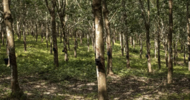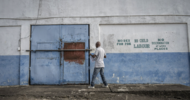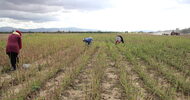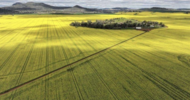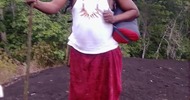An investigation by the ABC has revealed that foreign interests are buying up large tracts of Australian farming land. It has found that countries like China, Japan, South Korea, Saudi Arabia and Qatar were eyeing off arable land around the world to secure the food for their increasing demands.
Just yesterday New Zealand's Green Party drafted a bill seeking to stop overseas buyers snapping up large tracts of New Zealand land. The members bill would remove the ability of foreign buyers to purchase sensitive rural land and include anything more than five hectares.
Australian farmers also fear they may have trouble coping with future food and water demands if foreign interests snap up too many of the nation's agricultural resources.
Presenter: Emily Bourke
Speaker: David Farley, CEO of the Australian Agricultural Company; Philippa Langley, dairy farmers from north-west Tasmania; Betty Kay, real estate agent; Jim Hersey, farmer; Lynne Wilkinson, not-for profit organisation Ausbuy EMILY BOURKE: China's appetite for minerals is well known but increasingly China's developed a taste for Australian farming assets and it has the likes of David Farley worried. He's the CEO of the Australian Agricultural Company. DAVID FARLEY: Australian agriculture is a very attractive investment to a lot of offshore players at the moment and a very broad reach of players. And I think if the investments, sale investments are analysed there would be surprise on what size properties are being purchased and by who. EMILY BOURKE: The interest from China, Japan, South America and across the Middle East comes as many Australian farmers are keen to sell up and leave the game all together. Among those struggling to turn a profit are dairy farmers from north-west Tasmania, including Philippa Langley. PHILIPPA LANGLEY: The reason we actually put it on the market was a lot to do with the financial crisis that hit. And you don't see a way out and I said to James one day, I said, 'What are we doing here? You know, we're working extremely hard. We're getting paid nothing'. EMILY BOURKE: The trouble is many can't find local buyers. Real estate agents like Betty Kay are looking overseas. BETTY KAY: My motivation for going to China was that I was feeling helpless with not being able to tell the people when they phoned me up and asked 'Is there any buyers out there for our property?' People have been here and looked. There's been no real interest in buying farms. When they do their budgets there's no way it's sustainable. EMILY BOURKE: Farmer, Jim Hersey says he's torn. JIM HERSEY: Put yourself in our position, where we're all going to lose it if it stays like it is and we'll all be down the chute. So would we be happier to let foreign ownership come in and buy us and at least finish up with something to give our families, you know? Or we just go down the chute and then they come in and just take it over anyway. EMILY BOURKE: Lynne Wilkinson from Ausbuy, a not-for profit organisation that represents Australian-owned companies has deep reservations about farming land falling into the hands of overseas entities. LYNNE WILKINSON: When you talk Chinese companies you're talking the Chinese centralised government. They are interested in the vineyards. We also know that there is a Saudi company interested in Cubbie Station. And again you're talking about a country trying to buy some of our assets, and in that case it is a strategic issue. Now I understand, most recently, the Government has offered $50 million for the water license for Cubbie which may be enough to get them out of trouble and at least keep it in Australian hands. You see, when foreign countries take over our assets, or foreign companies take over, they buy our wealth creating assets, they buy cash flow, and they're buying our export markets. It's Australians who have built these assets and that's what we object to. And a lot of this is happening under the Foreign Investment Review Board benchmarks. And that's a major concern for us. DAVID FARLEY: Food supply, like energy supply, ultimately will come down to part of our national security program. EMILY BOURKE: David Farley from the Australian Agricultural Company again. DAVID FARLEY: I think the only thing we have to fear is that if we lose the proper governance of that land or those assets, if we lose productivity from those assets, or if they're no longer contributing to our country as far as economic and social good and well-being is concerned. EMILY BOURKE: Some observers believe a disturbing picture lies ahead, exploding global populations and the concomitant demand for dwindling resources under the pressure of climate change. They argue it will be a perfect storm for political instability, social turmoil and the mass movement of refugees. They're hoping Australia takes note now and starts to prepare.






